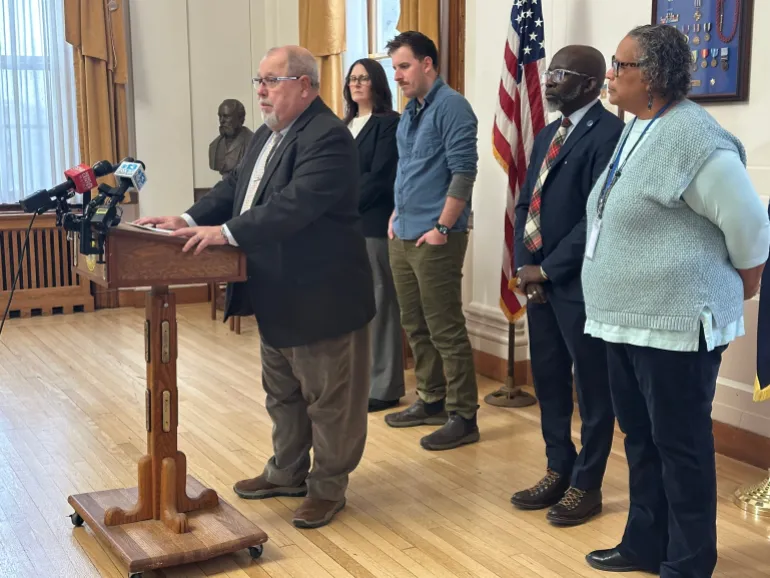‘Catch of the day’: Trump launches new ICE immigration crackdown in Maine | Donald Trump News
The administration of United States President Donald Trump has announced its latest immigration enforcement operation, this time in the northeastern state of Maine.
On Wednesday, the Department of Homeland Security confirmed that immigration raids had begun a day earlier, under the name “Operation Catch of the Day”.
Recommended Stories
list of 3 itemsend of list
In a statement, a Trump administration spokesperson appeared to signal that targeting Maine was a political response to the ongoing feud between the president and the state’s governor, Democrat Janet Mills.
“Governor Mills and her fellow sanctuary politicians in Maine have made it abundantly clear that they would rather stand with criminal illegal aliens than protect law-abiding American citizens,” said spokesperson Tricia McLaughlin.
But rumours have swirled that Maine was singled out for its significant Somali American population in the cities of Portland and Lewiston. Estimates put the total number of Somali Americans in the state at about 3,000.
Trump has repeatedly denounced the Somali community over the past several months, comparing its members to “garbage” at a December cabinet meeting. As recently as Tuesday, he used his White House podium to call Somalis and Somali Americans “ a lot of very low IQ people”.
Racist and anti-immigrant rhetoric has been a trademark of Trump’s campaigns for public office, and he has repeatedly singled out specific groups – including Haitians and Mexicans – to falsely tie their immigrant identity to pervasive criminal activity.

Parallels with Minnesota
Trump’s focus on the Somali community comes after a handful of members were implicated in a fraud scandal in Minnesota, a midwestern state where immigration enforcement operations were launched in December.
Those efforts have been marked by violent clashes between federal agents and protesters, and one woman, 37-year-old Renee Nicole Good, was shot dead in her car after an interaction with Immigration and Customs Enforcement (ICE).
Fears that those tensions could spill into Maine dominated a Wednesday news conference with city officials in Portland.
Mayor Mark Dion told reporters that immigrant communities in the region felt “anxious and fearful” as ICE agents began their crackdown.
“They see this action as unpredictable and a threat to their families,” he explained.
He also questioned whether a heavy-handed operation was necessary to address immigration infractions in the area, and he called on ICE to adopt different tactics than it had in Minnesota.
“I want to underscore one important point: While we respect the law, we challenge the need for a paramilitary approach to the enforcement of federal statutes,” Dion said.
“Federal immigration law is lawful. Its administration and enforcement is lawful,” he added. “What we’ve been concerned with, as a council, is the enforcement tactics that ICE has undertaken in other communities, which to our mind appear to threaten and intimidate populations.”
Nevertheless, Dion expressed optimism that ICE would adopt a more tailored approach to apprehending local suspects.
While the city of Minneapolis, Minnesota, has seen nearly 2,000 immigration officers flood its streets, the mayor predicted that Maine would not see the same “massing of federal agents”.
“We’re seeing very individualised activity by ICE. A person here, a neighbourhood there,” he said. “Their conduct, at least as it is current in Maine, seems to be focused, which would indicate to me – and this is the speculation – that they’re functioning on the basis of an actual court warrant.”
That, he said, marked a departure from the “random, show-me-your-papers kind of experience” that residents had experienced in Minnesota.

Outrage at ICE operations
Still, while Dion advocated for a wait-and-see approach to the ICE operation, other city officials took a harder stance.
One Portland city councillor, Wesley Pelletier, described the unfolding raids as part of “an agenda of white nationalism and might makes right”.
“This is a war of terror that’s being waged on our city by the federal government,” Pelletier said. “We’ve seen people of all ages getting thrown on the ground and getting thrown into trucks.”
So far, Fox News quoted ICE Deputy Assistant Director Patricia Hyde as saying the agency had made 50 arrests so far as part of operation “Catch of the Day”. Hyde added that ICE had identified nearly 1,400 individuals to detain in Maine.
Wednesday’s statement from the Department of Homeland Security highlighted four arrests as examples, showing people from Sudan, Guatemala, Ethiopia and Angola.
It described the four individuals as “the worst of the worst” and accused them of crimes ranging from aggravated assault to endangering the welfare of a child, though it was unclear in one case if the accusation had resulted in a conviction.
“We are no longer allowing criminal illegal aliens to terrorize American citizens,” McLaughlin said in the statement.
But Democratic officials in the state suggested that the Trump administration had refused to coordinate in the lead-up to “Catch of the Day”, heightening anxiety on the local level.
On January 14, nearly a week before the operation was launched, Governor Mills posted on social media that she had “attempted, unsuccessfully thus far, to confirm” the upcoming surge in federal immigration enforcement.
In a video statement, she said the state had reached out to local governments in Portland and Lewiston to prepare. She added that she too felt “angry” about the expected surge.
“Our goal, as always, will be to protect the safety and the rights of the people of Maine,” Mills said.
“To the federal government, I say this: If your plan is to come here to be provocative and to undermine the civil rights of Maine residents, do not be confused. Those tactics are not welcome here to the people of Maine.”
She also took a jab at the trend of federal agents using masks and other facial coverings to conceal their identities.
“Look, Maine knows what good law enforcement looks like because our law enforcement are held to high professional standards,” Mills said. “They are accountable to the law. And I’ll tell you this: They don’t wear a mask to shield their identities, and they don’t arrest people in order to fill a quota.”

A political rivalry
Mills and Trump have long been political adversaries, with their feud erupting in a public forum. In February last year, shortly after Trump returned to office for a second term, he hosted a White House gathering for governors, where he called out Mills personally.
“Is Maine here? The governor of Maine?” Trump said while outlining policies barring transgender athletes from sporting events. “Are you not going to comply with it?”
“I’m complying with state and federal law,” Mills responded. The tension escalated from there.
“You’d better comply because otherwise you’re not getting any, any federal funding,” Trump shot back.
“See you in court,” Mills replied.
“Good. I’ll see you in court. I look forward to that. That should be a really easy one. And enjoy your life after, governor, because I don’t think you’ll be in elected politics,” he said.
The interaction made national news and cemented the frosty relationship between the two leaders, with Trump demanding an apology and slamming the Democratic governor for months afterwards.
His administration also took a series of escalating actions designed to target Mills, including launching an education probe in her state, suspending a marine research grant and freezing other federal funds to Maine.
In response to this week’s ICE deployment, Mills issued a short statement acknowledging the Trump administration’s latest efforts.
“Together, we will continue to place the safety and civil rights of Maine people above all else, and remain vigilant in our defense of due process and the rule of law,” she wrote.
Maine is set to hold its next gubernatorial race in 2026, as part of the year’s midterm election cycle.
Having served two terms as governor, Mills is not eligible for re-election and will instead be making a run for the US Senate, challenging Republican incumbent Susan Collins.



